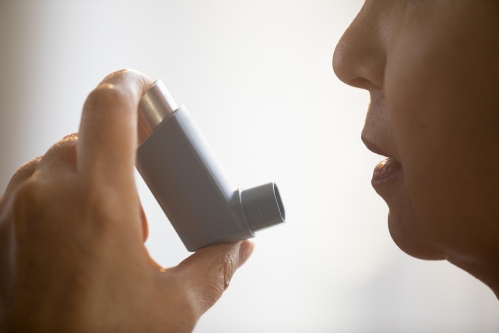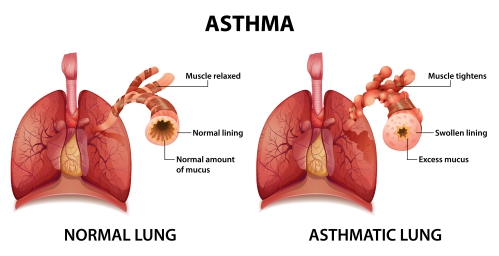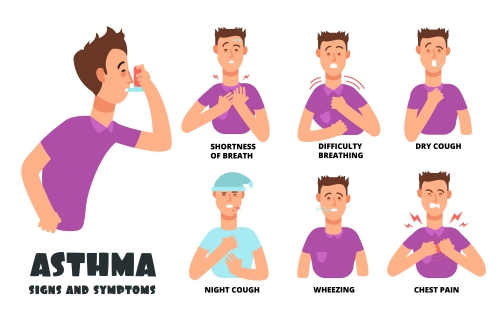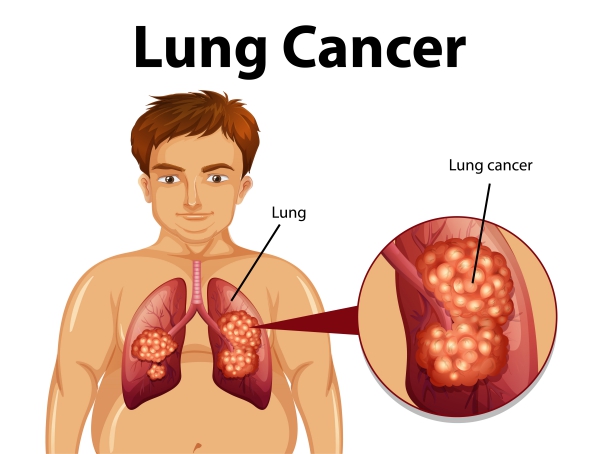Asthma, inhaler, asthma symptoms, lungs
Description : Asthma can affect your daily activities and can be life-threatening. But with proper medication and
Article Details :
What is asthma?
Asthma is a condition in which inflammation causes your airways to narrow and swell. There may be increased mucus production in your airways as well. An asthma attack or exacerbation leads to breathing difficulties, cough, shortness of breath and wheezing (a whistling sound upon breathing).
Asthma can affect your daily activities and can also be life-threatening. According to the centers for Disease Control and Protection (CDC), around 25 million of adults and 7 million of children are affected by asthma in the United States.
For air to reach your lungs, it has to go through your mouth or nose, down your wind pipe and into your airways. Unfortunately, asthma causes narrowing of your airways, making it difficult to get air to your lungs. In addition, mucus fills up your airways causing obstruction which aggravates the situation. However, with proper medication and education about the disease, you can regain a normal life.
Causes of asthma
There are many causes of asthma and some of them are:
- Genetics: if you have a parent or sibling affected by asthma, you are at increased risk of developing it
- Hygiene hypothesis: this is a hypothesis which suggests that when a child is not exposed to enough bacteria in their early years, they are more prone to develop asthma as their immune system is not very well developed
- Atopic dermatitis: this is an allergic condition which is often associated with asthma. Signs and symptoms are red & itchy skin and also hay fever (allergic rhinitis; runny nose and itchy eyes
- History of viral infections: previous infection by Respiratory Syncytial Virus (RSV) during childhood can increase your risk of developing asthma
- Being overweight
In addition, exposure to several substances that usually trigger allergies can trigger asthma. These include:
- Common cold
- Airborne allergens (mold spores, dust mites, pollen and animal dander)
- Physical activity
- Air irritants
- Cold air
- Strong emotions and stress
- Medications (beta blocker, aspirin and non-steroidal anti-inflammatory drugs)
Types of asthma
There are many variants of asthma and the most common one is bronchial asthma where your airways are narrowed making it difficult to breathe. Other types of asthma includes:
-
Intrinsic asthma (non-allergic asthma):
This type of asthma is usually caused by air pollutants such as:
- Cigarette smoke
- Burning wood
- Air pollution
- Cold air
- Air fresheners and perfumes
- Viral diseases
-
Extrinsic asthma (allergic asthma):
The common triggers of this type of asthma includes:
- Mold
- Pollen
- Animal dander
- Dust mites
-
Occupational asthma:
Common triggers of occupational asthma (workplace such as textiles, farming, manufacturing and woodworking industries) includes:
- Dyes
- Dust
- Fumes
- Gases
- Animal proteins
- Rubber (latex)
- Chemicals (industrial)
-
Medication-induced asthma:
This type of asthma is very severe and occurs within minutes or hours following ingestion of medications such as aspirin and non-steroidal anti-inflammatory drugs (NSAIDS)
-
Exercise-induced asthma (exercise-induced bronchoconstriction):
This type of asthma occurs within minutes after physical exercises where you feel excessive shortness of breath and chest tightness.
Signs and symptoms of asthma
The signs and symptoms of asthma varies from person to person and the main ones are listed below:
- Wheezing (the most common sign of asthma which is a whistling sound made upon exhaling)
- Chest tightness
- Chest pain
- Shortness of breath
- Inability to sleep due to symptoms
- Coughing
If your symptoms are becoming more frequent or if it is more and more difficult for you to breathe, it may be that your condition is worsening and immediate medical attention is required.
Making a diagnosis
To diagnose asthma a combination of medical history, physical examinations and breathing tests (spirometry) is used:
- Medical history: If you have a parent or sibling who suffer from asthma, you are at increased risk of developing asthma. In addition, your doctor will also ask you about any allergies to medications, previous episode of symptoms and other specific Read more








